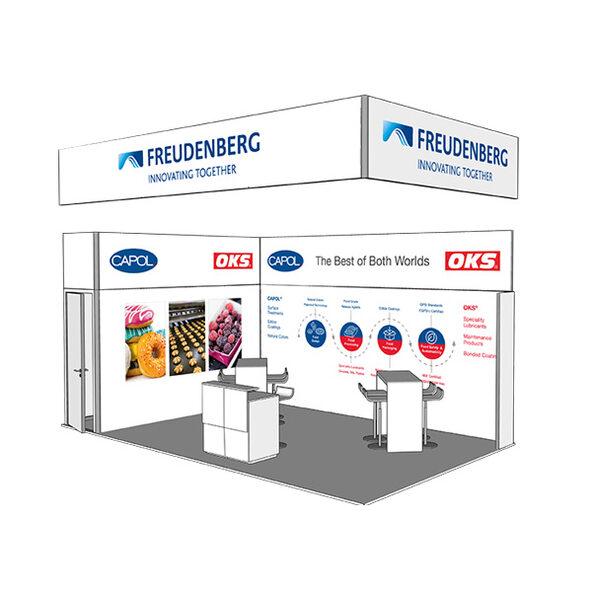Anuga FoodTec ‒ OKS and Capol bundle sustainability expertise
-
Specialists from the Freudenberg Group help companies in the food processing industry to reduce their carbon footprint
-
Presentation of a comprehensive range of product solutions with optimised sustainability
-
Support for manufacturers in the conversion to fully sustainability, standard-compliant process chains
04/26/2022 – 04/29/2022
Cologne, Koelnmesse, Hall 7, Booth D078
Cologne, 25 April 2022 – Two companies in the Freudenberg Gruppe, both of whom are suppliers to food producers for food refinement and processing, will be at Anuga FoodTec to present solutions for full sustainability and compliance throughout the industry’s entire process chain.
Both OKS, a renowned supplier of speciality lubricants, and Capol, the leading manufacturer of gloss, parting and sealing agents, offer a wide range of products with optimised sustainability that are among the leading solutions in their market segments. The two companies are members of the Freudenberg Group, which is not only committed to minimising its own ecological footprint, but also that of its users and customers. This year's Anuga FoodTec will be the first time that Capol and OKS present their product portfolios together as an expert team for food manufacturers.
Food production facing significant challenges
Manufacturers are currently faced with dramatic price increases for raw materials, energy and logistics. Challenges in the areas of regulation and sustainability look set to remain unchanged in the medium and long term. Product and food safety requirements are constantly increasing and require compliance with standards as well as certification (such as NSF H1, HACCP or REACH). Current discussions also surround guidelines for the reduction or avoidance of MOSH/MOAH substances (mineral oil residues in products). As long as there is no legal definition, manufacturers are forced to move in a grey area. And within supply chains, evidence of ethical procurement and ESG (Environmental, Social and Governance) reporting will increase significantly.
Lubricants, parting agents and coatings as drivers of efficiency
In the food production industry, the focus is therefore on the entire value chain. As drivers of efficiency for the reduction of emissions, lubricants, parting agents and coatings assume particular importance, both in production and disposal. After all, some 8% of global CO2 emissions attributable to nutrition and food production are generated in the areas of food processing and packaging.
Modern lubricants help to increase the efficiency and service life of plants – which represents an important contribution to sustainability and lower operating costs. According to the German lubricant industry association (VSI) annual damage through friction and wear is estimated to amount to approx. 30 billion euros. Optimal lubrication in food production can contribute to sustainability by extending maintenance intervals, reducing lubricant consumption and waste, saving energy through lower friction and thus reduced CO2 emissions and lower cleaning agent consumption. Lubricants therefore play a key role in resource efficiency.
Coating and parting agents that are normally used in food refinement can also achieve significant efficiency gains in the process chain. Coatings protect food; parting agents reduce waste and ensure simpler processes. The result is shorter processes and lower or even no production or food waste.
Application examples for footprint reduction in food production
- Extremely low temperatures in the production of deep-frozen products present a significant challenge to the lubricants approved for this purpose. This is why only special high-performance lubricants can be used here. With its OKS 3710 low-temperature oil, OKS offers food producers a product for this application that not only has NSF H1 certification, but is also MOSH/MOAH-free, hygienically harmless and completely sustainable.
- In the bakery industry, for instance, modern, sustainable parting agents reduce waste (no loss through sticking or deformed, unsightly goods) and create more efficient process flows. In bakery production, parting agents also enable the use of metal moulds, which are significantly more durable than wear-prone silicone moulds. Intermediate films for fresh products such as sliced cheese or ham can also be replaced by parting agents, thus reducing packaging and microplastics. The parting agents themselves are produced by Capol using certified organic, renewable raw materials and also as vegan products.
- Sustainable, edible coatings help to reduce food waste. For fresh produce such as fruit, they increase shelf life and reduce waste by limiting the formation of bacteria and protecting products during transport.
The formation of an expert team for the food industry
In time for Anuga FoodTec, Capol and OKS have intensified their collaboration for companies in the food processing industry. In addition to their joint trade fair appearance, an expert team will be formed to advise manufacturers on how the use of complementary products by Capol and OKS can help them to make their production processes more sustainable and efficient.
In the future, both companies want to roll out their existing knowledge and expertise to adjacent and new areas of application in food processing and packaging. As part of this, Capol will use its expertise in parting agents and coatings to develop new solutions in the packaging area, which will also help to solve problematic application cases in terms of MOSH/MOAH.



